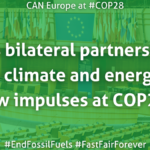Today the European Commission has published its proposal for the post-2020 EU budget, kicking off the political battle over the rules and priorities that will govern EU spending in the period 2021-2027. The Commission has chosen climate action to be one of the top priorities for future EU funding.
The proposal indicates how big the future EU budget should be, how it should be filled, and what the main priorities for future funding should be.
Climate action has been identified as one of the main priorities for future funding. While the current budget for the period 2014 to 2020 has a 20% climate action spending target to be implemented horizontally throughout all spending programmes, the new proposal sets apart 25% of the EU budget for climate action. This 5% increase compared to the current climate spending results in a total of €320 billion for climate action during the entire period (2018 prices).
Markus Trilling, finance and subsidies policy coordinator at Climate Action Network (CAN) Europe, said: “The European Commission acknowledges the EU budget’s role in tackling climate change. More money is needed to boost European and international climate action. So far the green potential of the EU budget has regrettably been untapped. It is a good sign that the European Commission considers increasing the share of the future budget dedicated to climate action.”
“To bring European economies closer to the Paris Agreement, the post-2020 EU budget must spend at least 40% on the decarbonisation of energy, industry and mobility systems, and ensure not one cent will benefit fossil fuel-related activities and infrastructure. In the upcoming negotiations, Member States must support French President Emmanuel Macron’s plea for a 40% share of the next EU budget to be dedicated to climate action and the ecological transition.”
ENDS
Contact:
Nicolas Derobert, CAN Europe Communications Coordinator, nicolas@caneurope.org, +32 483 62 18 88
Notes to editors:
– The green potential of the current EU budget is still largely untapped. In average, only 7% of all Cohesion Policy funding in 2014-2020 is allocated towards energy efficiency, renewable energy and SMART electric projects.
– Our infographic “3 pillars for a Paris-compatible EU budget” is accessible here.
– Below a timeline for upcoming decisions related to the next Multiannual Financial Framework:
- 02/05/2018: Multiannual Financial Framework beyond 2020 package, including a Multiannual Financial Framework beyond 2020 Communication, a Multiannual Financial Framework Regulation, instrument(s) on own resources, and a report on results of evaluations and/or added value.
- 29/05/2018: Legislative sectoral proposals for spending programmes, including European Regional Development Fund, Cohesion Fund and Common Provisions Regulation; Investing in People, Social Cohesion & European Values programmes; Economic and Monetary Union Programmes; Common Agricultural Policy, European Maritime & Fisheries Fund and the Life programme for Environment and Climate Action.
- 06/06/2018: Legislative sectoral proposals for spending programmes, including Research and Innovation (Framework Programme 9, ITER and Euratom); European Strategic Investment (Connecting Europe Facility, Digital Programme and InvestEU) and Space; Single Market Programme, Fiscalis and Customs.
- 12/06/2018: Legislative sectoral proposals for spending programmes, including Migration, Border Management and Security; Nuclear Safety; European Defence Fund; Neighbourhood and the World; European Peace Facility.
Climate Action Network (CAN) Europe is Europe’s largest coalition working on climate and energy issues. With over 150 member organisations in more than 30 European countries – representing over 44 million citizens – CAN Europe works to prevent dangerous climate change and promote sustainable climate and energy policy in Europe.

